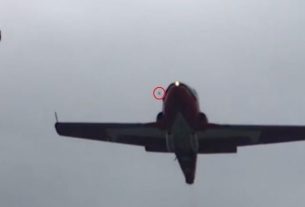**** CAF Release
Operational pause of CH-148 Cyclone fleet lifted
The Commander of 1 Canadian Air Division, Lieutenant-General Alain Pelletier, has lifted the operational pause on the CH-148 Cyclone maritime helicopter fleet.
The return to flying operations follows a thorough risk assessment that outlined mitigation measures to ensure aircrews understand the conditions that led to the crash and how to avoid or resolve them.
While the Directorate of Flight Safety investigation continues, information that the investigation uncovered to date —primarily from the Cyclone’s flight data recorder — allowed the investigative team to replicate the conditions in the CH-148 Cyclone flight simulator and rule out any mechanical failure. This revealed that the aircraft’s flight director was set to hold a specific altitude and airspeed. Thus, during the complex manoeuvering turn to align with the ship, the pilot’s inputs were significantly different from the autopilot settings and the aircraft did not respond in a way that the crew was expecting. The investigative team has confirmed that this rare anomaly only occurred under a very specific and narrow set of circumstances. The crew would have had no previous exposure or experience on how to handle this situation.
With these circumstances now clearly understood, the RCAF has completed a detailed risk assessment and is implementing mitigation measures to allow for the safe resumption of flying operations.
Quotes
“I truly appreciate the professional efforts of the Canadian Armed Forces airworthiness authorities who have contributed to both the investigation and risk assessment. I have the fullest confidence in their work, the Cyclone fleet, and our ability to safely return the maritime helicopter community to flying operations. We will do so in memory of our fallen.”
Lieutenant-General Al Meinzinger, Commander Royal Canadian Air Force
“The Canadian Armed Forces continues to mourn the six members we so tragically lost on April 29. The best way we can honour them is to get back into operations in a safe and deliberate manner and carry on our maritime mission in support of the Royal Canadian Navy. The resumption of flying for the CH-148 Cyclone fleet allows our maritime helicopter community to return to what they do best — using a leading-edge aircraft to support naval operations. While the Flight Safety investigation continues to work towards a more complete understanding of this tragic accident, the information uncovered so far has allowed us to thoroughly analyze what happened and mitigate risk to allow the fleet to resume flying. As our Cyclone crews return to the air, we will continue to support the families of the fallen and their loved ones here at home.”
Lieutenant-General Alain Pelletier, Commander 1 Canadian Air Division and Department of National Defence’s Operational Airworthiness Authority
“Working with Lieutenant-General Pelletier and his team, I am confident that the measures put in place prior to lifting the operational pause ensure this aircraft is safe for operations and fit for its role. I remain committed with my team to looking after the continued airworthiness of the CH-148 Cyclone fleet.”
Brigadier-General Nancy Tremblay, Director General Aerospace Equipment Program Management and Department of National Defence’s Technical Airworthiness Authority
“It is critical to recognize that the investigation into the accident continues, and there is still a tremendous amount of work remaining to ensure we understand the exact circumstances that contributed to the incident. Because of this, while some information was shared with the Operational and Technical Airworthiness Authorities to facilitate the risk analysis process, details about the crash will remain privileged by the investigation until it is complete.”
Colonel John Alexander, Director of Flight Safety and Department of National Defence’s Airworthiness Investigative Authority
Quick Facts
- Through the detailed risk assessment process, the RCAF is making a number of updates to training, publications, and operational maneuvering that together decrease the risk to an acceptable level to allow for the resumption of flying operations.
- Updates to training and aircraft publications will increase aircrews’ awareness of the possible risk identified by the Director of Flight Safety, how to avoid it during flying operations, and how to recover it if does happen. Changes to aircrew and aircraft publications will deal with specific procedures for aircrew to follow.
- Aircrew will also receive ground training and go through simulator scenarios that will allow them to practice identifying specific flight conditions and taking recovery actions. Given the length of the operational pause, aircrew will also perform shore-based flight training to rebuild flying proficiency and regain currency.
- Changes in operational maneuvering of the aircraft will further mitigate risk while not affecting the Cyclone’s ability to effectively conduct operations at sea.
- These mitigation measures will prevent a similar accident from occurring in the future, while the investigation pursues a more complete assessment of the causes of the accident. Once the investigation is completed, the RCAF will determine what, if any, additional longer-term mitigation measures may need to be implemented going forward.




